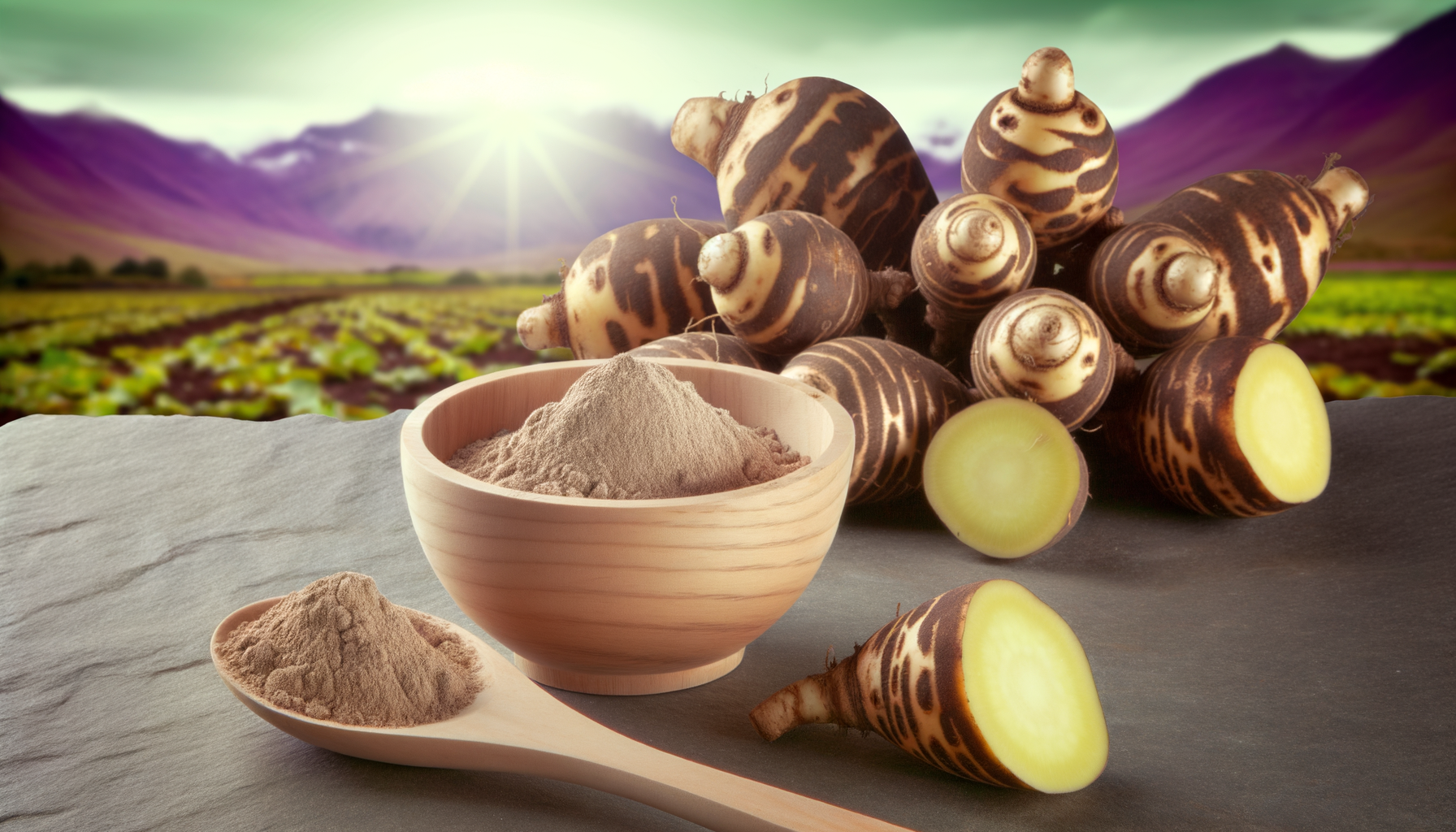Introduction to Maca
The maca plant, known scientifically as Lepidium meyenii and commonly referred to as “Peruvian ginseng,” has a rich history as both a traditional food and medicinal plant among the indigenous populations of the Peruvian Andes. For over 2,000 years, maca has been revered for its ability to enhance fertility, boost energy, and provide nutritional sustenance in the harsh climates of the high mountains. Its historical use extends to treating a range of ailments, from respiratory conditions to rheumatic diseases. The significance of maca in traditional Andean culture is profound, with its cultivation and consumption deeply rooted in the daily lives of the local people.
Botanical Description
Maca is a cruciferous vegetable, placing it in the same family as broccoli, cauliflower, and kale. The plant thrives at altitudes above 4,000 meters, where few other crops can survive. It is characterized by its rosette of leaves and its radish-like tuberous root, which is the part most commonly consumed. The maca root comes in various colors, ranging from white to black, each with distinct nutritional profiles and potential health benefits.
Adaptation and Cultivation
Native to the high Andean plateaus, maca has adapted to extreme conditions that include intense sunlight, freezing temperatures, and strong winds. This adaptability is a testament to the plant’s resilience and has allowed it to become a staple crop for Andean peoples. While traditionally grown in Peru, maca cultivation has expanded globally, including regions like China’s Yunnan province, as demand for the plant’s products has surged in recent years.
Nutritional Overview
Maca is a nutrient-dense plant, rich in fiber, proteins, essential amino acids, and a variety of vitamins and minerals such as iron, calcium, zinc, and potassium. It also contains unique bioactive compounds like macamides and macaridine, which are believed to contribute to its health benefits. Despite its traditional uses and nutritional content, scientific research on maca’s efficacy for various health claims is ongoing, with some studies showing promising results while others indicate the need for further investigation.
Nutritional Profile of Maca
Proteins and Amino Acids
Maca root is a good source of quality protein, containing all of the essential amino acids, which are the building blocks of proteins that our bodies cannot produce on their own. These amino acids are crucial for various bodily functions, including tissue repair, immune system support, and muscle growth. The protein content in maca makes it a valuable supplement for vegetarians and vegans looking to boost their protein intake naturally.
Fiber Content
Rich in dietary fiber, maca supports digestive health by promoting regular bowel movements and preventing constipation. Fiber also plays a role in maintaining a healthy weight, as it contributes to a feeling of fullness, which can help control appetite. Additionally, a diet high in fiber has been linked to a lower risk of developing heart disease and type 2 diabetes.
Complex Carbohydrates
Maca is abundant in complex carbohydrates, which are essential for sustained energy throughout the day. Unlike simple sugars that lead to quick spikes in blood sugar levels, complex carbohydrates provide a slow and steady release of energy. This makes maca an excellent food for athletes or anyone needing a natural boost to their energy levels without the crash associated with sugary snacks.
Vitamins and Minerals
The maca root is particularly rich in vitamin C, a powerful antioxidant that helps protect the body against free radical damage and supports the immune system. It also contains vitamins A and B, which are vital for maintaining good vision, skin health, and overall cell function. Maca is a treasure trove of minerals, including calcium, which is essential for bone health; iron, which is necessary for transporting oxygen in the blood; potassium, which helps regulate blood pressure; and zinc, which is important for immune function and wound healing. The presence of copper and manganese in maca further enhances its nutritional profile, supporting various enzymatic reactions and metabolic processes.
In conclusion, the nutritional profile of maca is impressive, offering a rich blend of proteins, fiber, complex carbohydrates, vitamins, and minerals. This combination not only supports overall health but also provides specific benefits such as increased energy, improved digestive health, and enhanced immune function. Incorporating maca into your daily diet can be a natural way to ensure you’re getting a wide range of essential nutrients.
By the way, something for you, a little gift!!!
I am just in the middle of publishing my book. It’s about How women can balance their hormones. One part is about food and diet, of course.
Follow this link and enter your email.
I will send you this part of the book for free once the book is published. It has many concrete, practical tips and recipes and will help you feel better during menopause or times of Big hormonal fluctuations.
Annette, Damiva Lead for Health & Wellness

Health Benefits of Maca
Libido and Sexual Health
Maca has been traditionally touted for its ability to enhance sexual health and libido. Scientific studies have provided some evidence supporting this claim. For instance, a study from 2002 found that men who consumed 1.5 to 3 grams of maca per day experienced an increase in libido. Similarly, a 2015 study indicated that maca root could help reduce sexual dysfunction in postmenopausal women on antidepressants. These findings suggest that regular consumption of maca may contribute to improved sexual well-being.
Athletic Performance and Energy
Athletes and fitness enthusiasts may find maca particularly beneficial due to its potential impact on energy and endurance. A pilot study in 2009 observed improved performance in male cyclists during a 40-kilometer time trial after using maca extract for 14 days. Although the study’s sample size was small, the results are promising, indicating that maca could be a natural aid for enhancing athletic performance.
Antioxidant Properties
The antioxidant properties of maca are noteworthy. Maca promotes the body’s natural antioxidants , such as glutathione and superoxide dismutase, which combat free radicals that can cause cellular damage. These antioxidants are crucial in preventing various health conditions, including heart disease and cancer, making maca a valuable addition to a health-conscious diet.
Skin Protection
Protecting the skin from harmful UV rays is another potential benefit of maca. Animal studies have shown that extracts from maca leaves may help prevent the formation of sunburn cells, suggesting that maca could contribute to skin health when used over prolonged periods.
Neuroprotective Effects
Emerging research indicates that maca may have neuroprotective effects, potentially improving learning and memory. Animal studies have found that maca could be beneficial in treating conditions that affect cognitive processes, such as Alzheimer’s disease. While human studies are needed to confirm these effects, the current evidence points to maca as a promising supplement for brain health.
In conclusion, the daily consumption of maca offers a range of health benefits, from enhancing sexual health and athletic performance to providing antioxidant support and neuroprotection. Its natural properties make it a valuable addition to a balanced diet, potentially contributing to overall well-being.
Maca and Disease Prevention
Cancer Prevention
Maca root is rich in antioxidant polyphenols and glucosinolates, which may help protect against cancer cells by inhibiting their growth. Antioxidants such as glutathione and superoxide dismutase, which maca promotes naturally, are crucial in the body’s fight against free radicals, potentially reducing the risk of cancer.
Cardiovascular Health
Consuming maca may also benefit cardiovascular health. Its potential to improve blood pressure, as indicated by a 2015 study, suggests that regular intake could support heart health. The presence of heart-healthy fatty acids and a favorable amino acid profile in maca may contribute to the overall cardiovascular benefits.
Menopause Symptom Relief
Maca has been observed to help balance hormone levels, particularly estrogen, during perimenopause. This hormonal regulation can alleviate common menopausal symptoms such as hot flashes, night sweats, and mood swings. A study found that postmenopausal women taking maca experienced reduced discomfort, suggesting it as a natural alternative for symptom management.
Fertility Enhancement
For those seeking natural ways to enhance fertility, maca may offer benefits. Studies have shown that maca can increase semen quality in men, potentially improving fertility outcomes. Its effects on female fertility have also been positive, with some evidence suggesting improved sexual function and libido, which are important factors in fertility.
Bone Health
Maca’s nutritional content, including calcium and potassium, is beneficial for maintaining strong bones. Animal studies have shown that maca may have protective effects on bone architecture, suggesting its potential role in fighting osteoporosis and enhancing bone health in humans.
In conclusion, the regular consumption of maca may offer a variety of disease-preventive benefits, from cancer risk reduction to the improvement of cardiovascular health, relief of menopause symptoms, enhancement of fertility, and the promotion of bone health. While more research is needed to fully understand these effects, the existing evidence provides compelling reasons to consider incorporating maca into a daily health regimen.
Maca in Traditional and Modern Cuisine
Culinary Uses
Maca, a root vegetable native to the Andes, has been a staple in traditional Peruvian cuisine for centuries. Its earthy, nutty flavor makes it a versatile ingredient in a variety of dishes. In its native land, maca is often boiled or roasted, similar to potatoes. It can be mashed, added to soups, or used as a filling in savory pastries. The leaves, although less commonly used, can be incorporated into salads or cooked similarly to other leafy greens. As maca has gained popularity worldwide, its powdered form has become a convenient way to integrate this superfood into daily meals, offering a simple yet powerful boost to nutrition.
Maca in Beverages
Maca powder’s mild taste allows it to blend seamlessly into beverages. It is commonly added to smoothies, where it pairs well with fruits like bananas and berries, as well as other superfoods like cacao and spirulina. Maca lattes have also emerged as a caffeine-free alternative to coffee, offering a subtle energy lift without the jitters. The adaptogenic qualities of maca make it an excellent addition to post-workout shakes, aiding in recovery and stamina.
Maca in Desserts
The slightly sweet, malty flavor of maca powder lends itself well to dessert recipes. It can be incorporated into baked goods such as cookies, cakes, and brownies, enhancing their nutritional profile. Maca is also a popular addition to homemade energy bars and balls, often combined with dates, nuts, and seeds for a wholesome snack. For a quick treat, maca can be sprinkled over yogurt or mixed into oatmeal, providing a subtle butterscotch note.
Versatility and Flavor Profile
Maca’s versatility extends beyond its traditional roots. Its unique flavor profile, described as a blend of earthy and nutty with hints of butterscotch, complements both sweet and savory dishes. In modern cuisine, chefs and home cooks alike experiment with maca powder to boost the nutritional value of various recipes. Its adaptability to different culinary applications makes it a valuable ingredient for those looking to enhance their diet with functional foods. Whether incorporated into breakfast, snacks, or desserts, maca’s flavor and health benefits can be enjoyed in countless ways.

Scientific Research on Maca
Studies on Sexual Health
One of the most prominent areas of maca research focuses on its impact on sexual health. A 2002 study found that men who consumed 1.5 to 3 grams of maca per day reported an increase in libido compared to those who received a placebo. Further research, including a 2010 review, suggests that maca could improve libido, although it emphasizes the need for more comprehensive studies. For women, a 2015 study indicated that maca root might help reduce sexual dysfunction in postmenopausal women on antidepressants. Additionally, maca has been studied for its potential to reduce erectile dysfunction. A 2009 study showed that males with mild ED experienced a more significant increase in sexual well-being after consuming maca root.
Athletic Performance Research
Maca is also popular among athletes for its supposed benefits in boosting energy and performance. A 2009 pilot study on male cyclists did not find a significant difference in performance from those taking a placebo, but it did note an improvement in libido. While these findings are intriguing, the small sample size and lack of significant performance enhancement highlight the need for further research to validate maca’s efficacy in sports performance.
Cognitive Function Studies
Emerging research suggests that maca may have neuroprotective effects that could enhance cognitive function. Animal studies, such as one conducted in 2011, have shown that maca could improve memory in mice. A 2014 review also posited that maca may benefit learning and memory performance, potentially aiding in the treatment of conditions like Alzheimer’s disease. However, the current evidence is primarily based on animal models, and human studies are necessary to confirm these potential cognitive benefits.
Long-term Health Impact
Long-term health benefits of maca are an area of growing interest. Maca’s adaptogenic properties may help the body manage stress and maintain cortisol levels, as indicated by studies on rats. It may also play a role in bone health, with a study suggesting increased bone density in menopausal women after maca consumption. Furthermore, maca’s rich antioxidant profile could contribute to its potential in disease prevention, including cardiovascular health and cancer. However, the long-term health impacts of maca require more extensive human studies to establish definitive conclusions.
In summary, while the scientific research on maca provides promising insights into its potential health benefits, it is clear that more rigorous, large-scale human studies are needed. The current body of evidence, though limited, supports the traditional use of maca for sexual health and suggests possible benefits for cognitive function, athletic performance, and long-term well-being.
Conclusion: Incorporating Maca into Daily Life
Summary of Benefits
Maca, a root native to the Peruvian Andes, has been recognized for its rich nutritional profile and potential health benefits. Historically significant as both food and medicine, maca is believed to enhance libido, sexual health, and fertility. It may also alleviate menopausal symptoms, improve mood and energy levels, and offer antioxidant properties that contribute to overall well-being.
Daily Consumption Recommendations
While the optimal dose for medicinal use of maca has not been firmly established, studies have utilized dosages ranging from 1.5 to 3 grams per day. To ensure quality and personalized dosage recommendations, consulting with a healthcare professional is advised. Maca can be easily incorporated into the diet through powders added to smoothies, oatmeal, or baked goods, and its nutty flavor complements many recipes.
Potential Side Effects
Generally considered safe for consumption, maca should be used with caution in certain populations. Pregnant or nursing individuals, those with hormone-sensitive conditions, or those with thyroid issues should consult a healthcare provider before use. Side effects are rare but can include stomach upset, sleep disturbances, or allergic reactions. In some cases, maca supplements have been associated with increased blood lead concentrations, underscoring the importance of choosing reputable products.
Final Thoughts on Maca
Maca’s ascent in popularity is backed by its historical use and the growing body of research supporting its health benefits. While more extensive human studies are needed to confirm its efficacy fully, the current evidence suggests that maca can be a valuable addition to a balanced diet. As with any supplement, it is crucial to consult with a healthcare professional to determine if maca is appropriate for your health needs and to establish a safe dosage. With its versatility and potential benefits, maca may well be worth considering for those seeking to enhance their daily health regimen.










